‘Hillbilly Elegy’ assesses responsibility, boundaries, discernment
“Hillbilly Elegy”(2020). Cast: Amy Adams, Glenn Close, Gabriel Basso, Haley Bennett, Freida Pinto, Bo Hopkins, Owen Asztalos, Stephen Kunken, Keong Sim, Morgan Gao. Director: Ron Howard. Screenplay: Vanessa Taylor. Book: J.D. Vance, Hillbilly Elegy. Web site. Trailer.
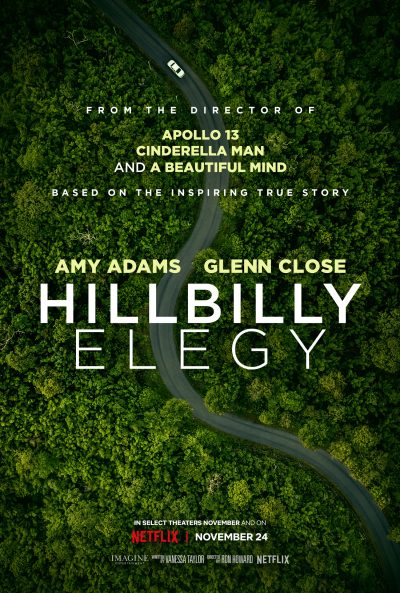
How far should we go when it comes to helping others? Many of us would probably say that we should do as much as we can. But what happens when those in need aren’t willing to help themselves? And how can we assess whether their needs are genuine or they are just being irresponsible? There are many fine lines to be addressed in those questions, and that process can be difficult without an adequate degree of scrutiny. Those are among the issues raised in director Ron Howard’s new, memoir-based domestic drama, “Hillbilly Elegy.”
Yale University law student J.D. Vance (Gabriel Basso) has led a colorful, if challenging life. Having grown up in Middletown, Ohio, he watched his community deteriorate from a once-thriving industrial center to an all-too-typical example of Rustbelt decline. But J.D.’s challenges have involved more than just the slide of his hometown’s economic conditions; he’s also endured life in an often-dysfunctional family, an upbringing full of highs and lows. And, by 2011, on the verge of his graduation, those domestic ordeals have reached a crisis point.
Much of the distress in J.D.’s life has come from his turbulent relationship with his mother, Bev (Amy Adams). As a single parent to J.D. and his sister, Lindsay (Haley Bennett), Bev has struggled to get by. To her credit, she managed to put herself through nursing school and land a job at a local hospital. Thanks to that position and the support provided by a string of suitors, she has been able to provide the essentials for her family. But that came with a catch: While working at the hospital, she developed an addiction to prescription painkillers, leading to an ongoing problem with substance abuse and an array of unpredictable psychological issues. She frequently launched into out-of-control tantrums, often taking out her frustrations on J.D. and Lindsay.
Bev’s efforts at getting clean over the years have been met with mixed results, largely due to her inability to get over her past. As the daughter of Appalachian hillbilly parents who moved to Middletown from Kentucky for work, she has long believed that she was held back from attaining the kind of success she felt she was capable of. She was an astute high school student, but she came to believe that a lack of family support to further her education kept her from fulfilling her potential, her nursing training notwithstanding. The frustration that arose from this led to her addiction issues and emotional outbursts, many of them directed at J.D.
Despite the pain J.D. has endured on the home front, he has had allies in his corner, most notably his grandparents, Papaw (Bo Hopkins) and, especially, Mamaw (Glenn Close). They would step in as needed, despite problems of their own, to care for their grandson when his mother got out of line, especially when J.D. was an adolescent (Owen Asztalos). In fact, J.D. has fond memories of summer visits to the family homestead in Kentucky, an opportunity to help him get in touch with his hillbilly roots and the ways of his people.
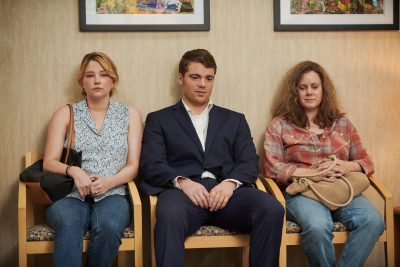
But, even with Mamaw’s assistance (particularly her signature brand of tough love), J.D. still didn’t have it easy. His colorful, crusty grandmother had her share of bad habits, behavior that led to her failing health. J.D. also often angered when Mamaw would back his mother, even when she blatantly misbehaved. He wondered how she could possibly sanction such unruly conduct. But, under those circumstances, Mamaw would pointedly remind J.D. that they were hill people and that they take care of their own when the need arises, no matter how frustrating or infuriating it might be.
It’s from this background that J.D. arrived at the family’s current crisis. While in the midst of interviewing with law firm recruiters at Yale’s New Haven campus, he receives a phone call from Lindsay that Bev has been hospitalized as a result of a heroin overdose. Lindsay begs J.D. to come back to Middletown to help out, a request that places him in a precarious spot. How can he justify a lengthy road trip from Connecticut to Ohio when his future is on the line, especially since, given Bev’s history, she’s unlikely to appreciate the effort? However, with the admonition Mamaw gave him years ago now hanging over him in a time of crisis, he reluctantly makes the journey, hoping that it will do some good.
J.D. thus embarks on his trip, providing him with an opportunity to reflect upon his past. Through a series of flashbacks, he recalls an array of incidents from his upbringing. These sequences are intercut with the unfolding of his current circumstances, many of which echo the ordeals he went through with Bev over the years. At some point, he realizes he’ll have to make a crucial choice: Can he continue to support his mother, bad behavior and all? Or will he reach a point where he’ll finally have to cut the cord, despite the lessons that were impressed upon him in his upbringing? With the future of his law career on the line with the recruiting interviews he’s scheduled to attend, can he afford to pass up that opportunity to care for someone who doesn’t appreciate his assistance? That’s what J.D. is up against, with clocks ticking simultaneously on two different fronts.
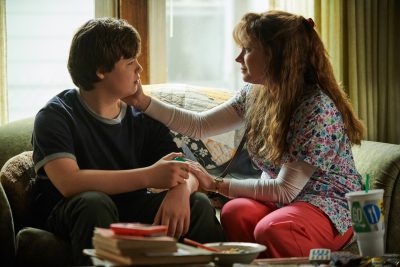
No matter how we may lead our lives, one thing is for sure – we’re each responsible for what happens to us, no matter how much we may dislike some of what occurs. Some of us might find that difficult to accept and look for ways to pass the buck onto other people or circumstances. However, regardless of the degree we attempt to do that, there’s no escaping that the conditions in which we find ourselves begin with us, for better or worse. That’s because what we believe is what we become, the core concept behind the conscious creation process, the philosophy that maintains we draw upon the power of our beliefs in manifesting the reality we experience. And, given the power and persistence of those resources, the creations that stem from them can arise and hang on relentlessly and with tremendous impact until we make an effort to change them.
Some might contend that’s an unfair assertion since we may not be aware of this or of the specific beliefs that give rise to the outcomes in such situations. That’s particularly true when our beliefs yield results that seemingly don’t suit us. It’s an argument that even has some apparent merit. Nevertheless, however, disavowing our involvement in this process only delays how and why we manifest these circumstances in the first place. In many instances, this is related to learning particular life lessons, and one of the most common of these is, interestingly enough, learning how to take responsibility for ourselves, our beliefs and our creations, whether or not we approve of what results.
Given the dynamics of what transpires in this story, responsibility obviously plays a crucial role, especially where Bev is concerned. She feels as though life cheated her in her quest to see what she might have become, and her seeming inability to change that led to the despair that prompted her escape into addiction. She believes her life “happened” to her, which she believed gave her an out when it came to matters of responsibility, her own brand of justification for her substance abuse issues. And anything of an irresponsible nature that arose from that behavior, in turn, could be blamed on the addiction that left her out of control.
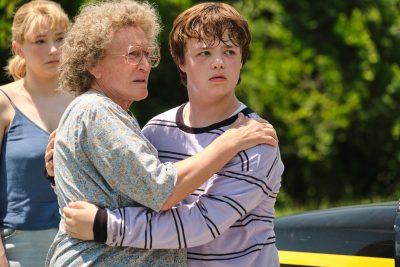
Ironically, circumstances like these are ideal for learning a lesson in responsibility, even if it may not seem so at the outset. The setbacks are aimed at forcing the creator (in this case, Bev) to see how, why and from whom those results arose. Of course, the speed at which lessons are learned in these scenarios depends on how quickly their creators are able to recognize their source, especially when it comes to identifying the manifesting beliefs involved. If one were to repeatedly deny the source, one would have to experience the lesson repeatedly until the message sinks in. And, in all likelihood, the intensity of each subsequent iteration would grow to help increase the chances of the situation being successfully recognized for what it is. It’s as if the ante is continually upped until the word gets through, which is precisely what Bev experiences with her own trials and tribulations.
It’s curious to see how Bev has failed at this over the years, especially in light of the teachings dispensed by Mamaw and, later on, by J.D. As Bev’s irresponsible behavior continues unabated, both her mother and son don’t hesitate to point out what’s going on – and the message still doesn’t sink in. Bev’s unwillingness to recognize this ultimately prompts repeat incidents, which, in itself, illustrates just how powerful and persistent our beliefs can be. They can hold on for dear life, even if they result in outcomes that are not in our best interests. That’s how badly they’re intended to convey the lessons we were meant to get. For our own well-being, we’d be wise to take the time to listen to ourselves and analyze what our circumstances (and the beliefs that created them) are trying to tell us – and teach us.
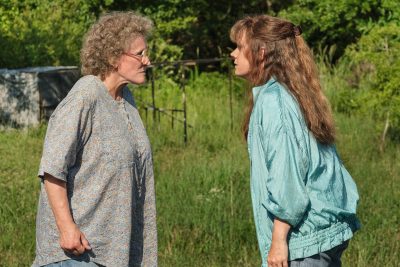
Bev is not the only one who’s learning a responsibility lesson in this story. J.D. is going through a similar process by learning how to take responsibility for himself when it comes to establishing healthy boundaries with others. Indeed, as frustrated as he may become with Bev’s behavior, he has difficulty pulling back when she’s in trouble, no matter how much her actions may affect him as circumstances play out, even as an adult. He’s obviously taken to heart the lesson he learned in his youth about caring for those around him, but does he know when to draw a line in the sand, even when it involves a close relation? If he continues to put others’ interests before his own, isn’t it possible that he may be doing a disservice to himself at some point? And, even if he were to recognize that, can he truly let go when the time is right for him to do so? How long is he going to allow his beliefs to hold on when they start to threaten his welfare?
One of the ways we can address issues like this is to hone our powers of discernment, particularly when it comes to seeing our situations for what they are and the beliefs that spawn them. This may take some practice to develop, but, once we become proficient at it, we can spare ourselves considerable anguish, frustration and disappointment. It might also play a vital role in helping us to better refine our own beliefs, especially when it comes to responding to circumstances that we find questionable, unproductive or potentially damaging. It could indeed go a long way toward addressing many of the questions raised in the preceding paragraph.
Discernment often benefits from sharpening our intuitive skills, a capability in which many of us could use improvement. That’s certainly true for many of the principals in this story. They, like the rest of us, could learn a lot from Mamaw. At many points in the film, she has a laser-sharp handle on her intuition, able to size up situations in a heartbeat and respond accordingly. She’s capable of spotting frauds at 50 paces and doesn’t hesitate to call others on their shit when necessary.
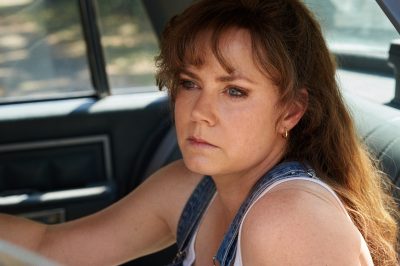
Intuitive proficiency can go a long way toward forging better beliefs and better outcomes. However, we must be careful not to become trapped by our own blind spots – beliefs that we hold onto at all costs, no matter how beneficial or detrimental they might be. Should we avoid that pitfall, though, there’s no telling what we might accomplish. If someone with J.D.’s background, for example, can create with the kind of skill that leads him to become a Yale law school graduate, there’s no telling how far we can go. Those who come from the hills just might find themselves able to climb mountains.
“Hillbilly Elegy” may have its flaws, but director Ron Howard’s domestic drama with a twist is far from the cinematic debacle that many reviewers have labeled it, making me wonder what film they watched and/or what agenda they may have. The film has been unfairly called boring (far from it) and clichéd (something that’s hard to imagine, given that it’s based on a fact-based memoir), attributes that are sorely misplaced. To be sure, the melodramatic dialogue and occasionally choppy editing could have been handled better in spots, and the “hillbilly” aspect of the story could have been better developed. However, there are heartfelt sentiments aplenty here, not to mention the outstanding performances of Adams and, especially, Close. Don’t buy into the bashing that’s been happening with this release; it’s patently undeserved. The film is available for online streaming.
Despite the many criticisms that have been leveled against this picture, thankfully the excellent performances have not been unduly overshadowed. The performance by Glenn Close as Mamaw has been richly recognized thus far, earning best supporting actress nominations in the Golden Globe, Critics Choice and Screen Actors Guild Award competitions. Not to be outdone, Amy Adams received a Screen Actors Guild Award nod for best lead actress. In addition, the film picked up a Critics Choice Award nomination for best hair and makeup.
It’s been said that “I am my brother’s keeper.” That’s certainly a noble sentiment, one that succinctly and eloquently sums up our need to show compassion for one another. But aren’t each of a “brother,” too? Don’t we have needs to be addressed, the kind that involve calling upon others to assist us? Yet can we be assured that such support will materialize when required, especially if we’re busy attending to the keeping of others? This is something that calls for balance, the kind that arises from all of us collectively being responsible and discerning toward one another. Those are qualities we can all benefit from, no matter where we hail from and no matter who we call family.
Copyright © 2021, by Brent Marchant. All rights reserved.



